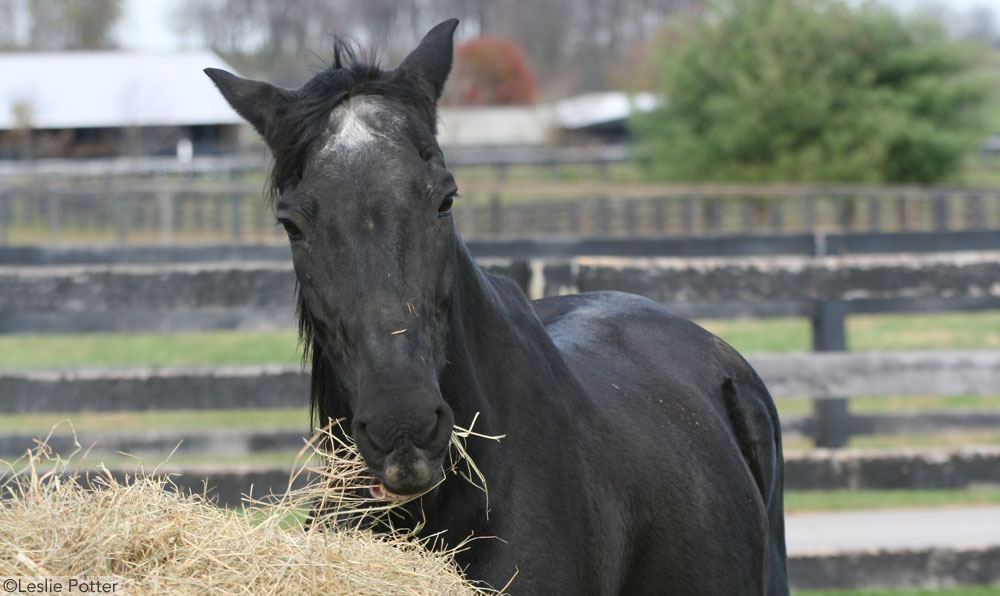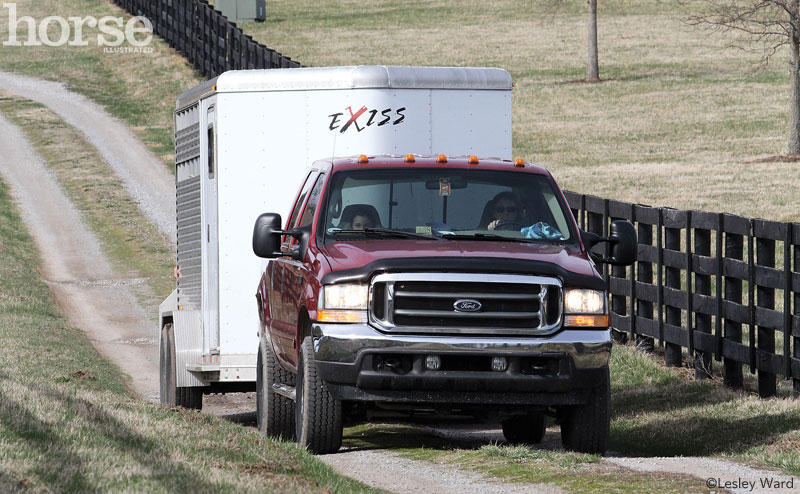
Q: My mare is a hard keeper. How can I maintain her weight easily?
A: Unfortunately, there may not be an “easy” way to maintain your mare’s weight. That’s why they call them “hard” keepers! But I can give you some suggestions to try and hopefully she will respond to at least one of them.

When it comes to forage, especially for hard keepers, quality and quantity both matter.
First, have your veterinarian perform a thorough physical exam on your mare from head to toe to make sure there are no medical reasons for her to have trouble maintaining weight such as parasites, infection, gastric ulcers, or other causes.
Once she’s been given a clean bill of health, the next step is to have a full nutritional consultation with your vet or a certified equine nutritionist. This would include body condition scoring and weight taping your mare, and keeping a journal of these values. It would also include walking through what, how, and how much she is fed now – as well as her turnout and exercise schedule – to determine if she needs to be fed more, fed more frequently, fed better quality, or fed different things.
The rule of thumb for forage is to feed a MINIMUM of 1-2 percent of the horse’s bodyweight daily. So if your mare weighs 1000 pounds, that’s 10 to 20 pounds of hay per day. Preferably, you’d provide closer to the upper end of the range, the 20-pound amount, especially as her current weight is probably less than what it should be. Maybe ideally she should weigh 1100 or even 1200 pounds, meaning her forage could range from 11 – 22 pounds or 12 – 24 pounds. Of course, if she’s like my late Thoroughbred gelding, the rule of thumb is only a guide and if she does better with 26, 28, 30 pounds of hay or more, don’t be afraid to feed this much. There’s no upper limit for hay!
Also like my horse, the TYPE of hay matters. While I alway kept good quality grass hay in front of him at all times, he also got several flakes of alfalfa hay at mealtimes to boost his caloric intake, his dietary protein levels, and his appetite. If alfalfa hay (or grass hay) is not available in your area, you can substitute with bagged chopped hay, cubed hay, pelleted hay, or even commercial hay stretchers.
If you are feeding long-stem forage, make sure it’s high quality and not several years old, brown or yellow in color, dusty or moldy, weedy, or in some other way unpalatable and not nutritious. Do your horse another favor by providing it in a hay net, preferably a small hole hay net. This keeps it off the ground where it can get urinated, defecated, or stepped on, and also mimics grazing by allowing small amounts continuously. It turns out that by feeding horses the way Mother Nature intended, thin horses gain weight and “thick” horses lose weight!
Of course, grazing fresh pasture (as long as your horse is medically cleared for the higher sugars in grass) can put a bloom on almost any horse, so try to include pasture time in your horse’s schedule, if possible in your area and in your situation.
Feedstuffs that have some characteristics of forage (like they get fermented) and some characteristics of grain (like they’re more calorie-dense) may also help your mare add weight. Think: beet pulp and complete or senior feeds.
Next comes the true concentrates or fortified grains. These you have to be a little careful about, as the rule of thumb here is to feed no more than 0.5 percent of a horse’s bodyweight per meal. If we use that 1000-pound horse example again, that’s no more than 5 pounds at one time, which is actually quite a bit if you weigh it out. And you should be weighing your grain, as well as your hay, to make sure you’re actually feeding what you think you’re feeding.
Besides common horse feedstuffs there are other products and ingredients that may just be what your mare needs. My advice is always to add or change one thing at a time and monitor closely so you know if it made a difference or not. Many horses thrive when fat is added to their diet, either as an oil, a powder, or as a component of something like rice bran. Other horses seem to blossom when a digestive supplement is added to their regular ration. These types of products contain probiotics, prebiotics, yeast, and/or enzymes, all of which have been shown to maximize digestive efficiency, helping the horse to extract every little bit of nutrition possible from the food he’s already getting.
I hope one of these ideas works for you and your mare, and that you keep your veterinarian in the loop as you try different things. Between the three of you (your vet, your mare, and you) hopefully you’ll find a solution!




